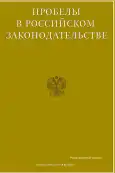Характеристика и условия, способствующие профессиональной преступности
- Авторы: Кравец И.П.1
-
Учреждения:
- Волжский государственный университет водного транспорта
- Выпуск: Том 15, № 5 (2022)
- Страницы: 413-423
- Раздел: Статьи
- URL: https://journal-vniispk.ru/2072-3164/article/view/147681
- ID: 147681
Цитировать
Аннотация
В статье дан анализ состояния характеристики и условиям, способствующим профессиональной преступности на современном этапе, ее тенденций и закономерностей развития, рассмотрены корни, истоки формирования преступного поведения и история развития профессиональной преступности в России. В целом профессиональную преступность отличает ряд особенностей, относящихся к причинам профессиональной преступности, личности преступника-профессионала, а также к специфике предупреждения профессиональной преступной деятельности. Целью представленного исследования является рассмотрение возникающих в данной сфере вопросов, касающихся характеристики и условий, способствующих профессиональной преступности, а также ее рецидивности, где борьба с ней являются важной задачей общества и государства. Значимость этой борьбы определяется особо негативным влиянием рецидивистов и профессиональных преступников на воспроизводство первичной преступности и тем самым на осложнение криминальной ситуации в стране; ростом совершения тяжких и особо тяжких преступлений, количество которых превышает 60% в структуре всей преступности. Решение этой задачи осложняется особенностями личности рецидивистов и профессиональных преступников, стойкостью их антиобщественной установки; продолжением преступной деятельности, несмотря на принимаемые к ней меры; использованием решительных и умелых преступных действий; вредным влиянием, оказываемым на неустойчивых лиц, распространением криминальной субкультуры. На основании исследования автор приходит к выводу, что существенным условием профессиональной преступности является и то, что государственные и общественные организации слабо работают над вовлечением освободившихся из мест лишения свободы лиц в здоровую в моральном отношении среду, над изоляцией их от влияния антиобщественных элементов. После отбытия наказания осужденных встречает, как правило, негативное отношение со стороны общества. Без целеустремленной работы с отбывшими наказание лицами невозможно обезопасить их от пагубного общения с профессиональными преступниками, оставшимися на свободе. Встречая настороженное к себе отношение, они начинают искать общения среди себе подобных, что приводит к совершению новых преступлений.
Полный текст
Открыть статью на сайте журналаОб авторах
Иван Петрович Кравец
Волжский государственный университет водного транспорта
Email: kipkn@mail.ru
канд. юрид. наук, заведующий кафедрой государственно-правовых дисциплин, Институт экономики, управления и права. Нижний Новгород, Россия
Список литературы
- Аванесов Г.А. Теория и методология криминологического прогнозирования М. 1972. С. 259-260.
- Авдийский В.А., Букалерова Л.А. Криминология. М. 2022. С.248-257.
- Алексеев А.И. Индивидуальная профилактика рецидива преступлений М. 1975. С.3.
- Герцензон А.А. Уголовное право и социология М.1970. С.116.
- Дмитриев О.В. Криминологическая и уголовно-правовая характеристика вымогательства по материалам Западно-Сибирского региона Дисс. кандидата юрид. наук 1994. С.79.
- Зуйков Г.Г. Криминалистическое учение о способе совершения преступления Автореф. дис. д.ю.н., М. 1970. С.12.
- Иншаков С.М. Криминология. М. 2000. С.182.
- Кравец И.П., (2022), Проблемы специальных мер предупреждения профессиональной преступности. Пробелы в российском законодательстве, 2: 134-143.
- Криминогенная ситуация в России на рубеже XXI века / Под общ. ред. А.И. Гурова. - М.: Изд-во ВНИИ МВД России. 2000. С. 68.
- Познышев С.В. Учебник уголовного права М. Наркомюст. 1923. С.175.
- Попов В.И. Рецидив преступлений. Дис.д.ю.н., 1999. С.27-29.
- Федеральный закон от 07.02.2011 N 3-ФЗ (ред. от 21.12.2021) "О полиции" // Собрание законодательства РФ. - 2011. - N 7. - Ст. 900.
- Федеральный закон от 06.04.2011 N 64-ФЗ (ред. от 01.10.2019) "Об административном надзоре за лицами, освобожденными из мест лишения свободы" // Собрание законодательства РФ. - 2011. - N 15. - Ст. 2037.
- Шутов Ю.И. Рецидивная преступность и меры борьбы с ней по советскому уголовному праву, автореф. дис. канд. юрид. наук. Свердловск, 1965. С.16-17.
- Яковлев А.М. Рецидив как объект уголовной политики, М.1978. С.8.
Дополнительные файлы








